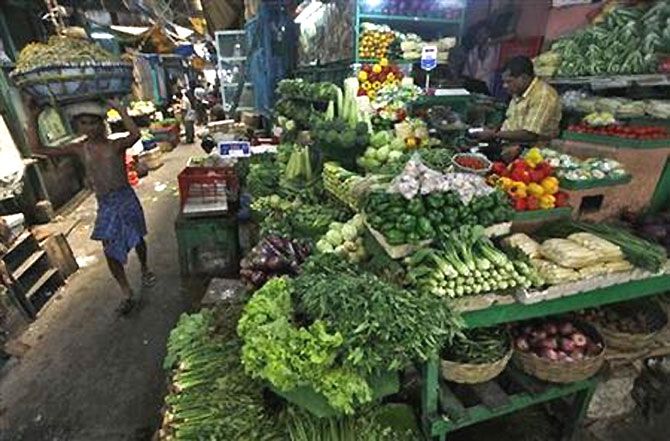
Much of recent increase is seasonal, teams to look for more pulses abroad to push into market
Government will increase the size of buffer stock of pulses to 0.80 million tonnes from the current 0.15 million.
Teams are being sent to Myanmar and Africa to scout for the legumes.
It could also consider pumping in more foodgrain into the market, to counter food inflation's rising trend.
On the price spike in many vegetables, officials said the general view after a meeting of senior ministers and bureaucrats was that it was a seasonal phenomenon, to subside after a few weeks.
The meeting at Finance Minister Arun Jaitley’s residence was attended by Agriculture Minister Radha Mohan Singh, Food Minister Ram Vilas Paswan, Transport Minister Nitin Gadkari, Commerce Minister Nirmala Sitharaman and Urban Development Minister M Venkaiah Naidu.
Finance Secretary Ashok Lavasa, Economic Affairs Secretary Shaktikanta Das, Revenue Secretary Hasmukh Adhia, and Chief Economic Advisor Arvind Subramanian also attended the almost hour-long deliberations.
Officials said the Centre’s procurement policy and what actions various departments need to take to deal with the spike in prices was discussed in detail.
“About 10,000 tonnes of pulses has already been released from the buffer stock. We will release more, based on demand from the states,” a senior official, aware of the discussions in the meeting, said.
Food Minister Paswan later told reporters his ministry has been asked to procure more pulses directly from farmers and also through imports.
This year's target is to procure 150,000 tonnes of pulses for the buffer stock creation. So far, 115,000 tonnes have been purchased during the kharif and rabi seasons, while the rabi procurement is still on, he added.
Paswan said the government had decided to send a team immediately to pulses-growing nations like Myanmar and to Africa, to explore government-to-government imports.
The meeting was also informed that Kendriya Bhandar, Safal and other government agencies were selling staple pigeon pea and green gram at Rs 120 a kg from their outlets.
Price rises of tomato, sugar and wheat was also discussed.
Tomatoes have more than doubled to Rs 100 a kg, due to crop damage. Paswan told the meeting this was a seasonal event and the commodity could not be stored, due to a short shelf life, unlike wheat or rice.
His ministry was keeping a close watch on prices of pulses, sugar, wheat, tomato and other essentials.
The country had imported 5.5 million tonnes of pulses last year.
Production is estimated to be 17.06 mt in the 2015-16 crop year (July-June), while demand is pegged at 23.5 mt.
Consumer price-based inflation touched a 19-month high of 5.76 per cent in May 2016, driven primarily by food inflation. Retail food inflation rose 7.55 per cent, compared to 6.4 per cent in April and 4.8 per cent in May 2015.
Among food categories, pulses showed a year-over-year increase of 31.6 per cent in May.
Wholesale price index-based inflation for the same month rose by 0.79 per cent, up from 0.34 per cent in April, when it showed the first monthly rise after 17 months of contraction, again primarily due to food inflation.
The price rise was 35.56 per cent in May, after a 36.36 per cent rise the previous month.
The image is used for representational purpose only. Photograph: Rupak De Chaudhuri/Reuters












 © 2025
© 2025